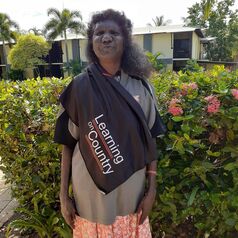
Hilda Ngalmi
Indigenous Teacher and Linguist, Indigenous Knowledge
Hilda Ngalmi is an Indigenous teacher-linguist and president of the school council at Numbulwar School.
Less ![]()

Hilde Coffe
Hilde Coffé is Professor in Politics at the University of Bath, Department of Politics, Languages and International Studies. Her main research interests include political behaviour, public opinion, political representation, and gender and politics.
Less ![]()

Hillary Smith
Senior Research Officer, James Cook University
I am an early-career researcher interested in the interactions between corals and macroalgae, and the possibility to manipulate these interactions in the context of reef restoration and rehabilitation. Using a mixed-methods approach, I investigate the interactions between reef taxa from the cellular to the ecosystem level. My work uses a range of techniques, including molecular biology and genomics, microbial ecology, physiology, macro-ecology, field- and lab-based experiments to understand the relationships between species. Recent work incorporates significant outreach and engagement through citizen science involvement in reef restoration research.
Prior to working in science, I had a career in the fine arts and fashion design, so I am passionate about communicating science and encouraging people with non-traditional academic pathways to pursue careers in science. I maintain an interest in the arts through a side-hustle making scientific illustrations.
Less ![]()

Hillary Jeanne Haldane
Professor of Anthropology, Quinnipiac University
I am an applied medical anthropologist who studies settler colonialism, Indigeneity, and gender-based violence in Oceania. I am also a scholar of the political economy of higher education. I have published books on both gender-based violence and higher education.
Less ![]()

Hilmer Bosch
Postdoctoral researcher on the Global Commission on the Economics of Water, University of Amsterdam
Dr Hilmer Bosch is a postdoctoral Researcher with the Global Commission on the Economics of Water at the University of Amsterdam. He holds degrees from the University of Strathclyde (MSc Environmental Entreperneurship), IHE-Delft Institute for Water Education (MSc Water Management and Governance) and a PhD from the Amsterdam Institute for Social Science Research at the University of Amsterdam. His unwavering passion lies in conducting research and shaping policies related to inclusive development, water justice and water property rights with a specific focus on the Global South.
Less ![]()

Hing-Wah Chau
Course Chair in Building Design & Senior Lecturer in Built Environment, Victoria University
Dr Hing-Wah Chau is the Course Chair in Building Design and Senior Lecturer in Built Environment. Before joining Victoria University in 2019, Dr Chau taught architectural design at the University of Melbourne at undergraduate and postgraduate levels for eight years (2011-2019).
He completed his doctoral research and the Graduate Certificate in University Teaching at the University of Melbourne in 2014 and 2018 respectively.
He received the Teaching Excellence Award at the Faculty of Architecture, Building and Planning at the University of Melbourne in 2018.
His research interests lie in sustainable built environment, architectural and urban design, design for ageing and inclusive design, as well as design for health and wellbeing.
He has published numerous refereed journal articles, refereed conference papers and book chapters.
Dr Chau received his architectural education in Hong Kong. He has more than ten years of professional practice experience in Hong Kong as a registered architect in an interdisciplinary environment involving in various projects from small public structures and public housing to large infrastructure.
Less ![]()

Hipólito Sanchiz Alcaraz
Teacher Assistant, Colgate University
Graduated in Journalism and Humanities from the San Pablo CEU University, my career has touched several points of knowledge. After graduating I did the Radio Master at COPE (Spain). Later, I was hired at Colgate University (USA) as an adjunct professor in the Spanish Department. Finally, it is worth highlighting my research work on historical battles in the history of Spain. More specifically, the battle of Cagayan.
Less ![]()
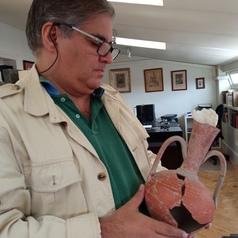
Hipólito Sanchiz Alvarez de Toledo
Profesor Adjunto de Historia Antigua Universidad CEU-San Pablo, Universidad CEU San Pablo
Hipólito Sanchiz Álvarez de Toledo es doctor en Historia Antigua por la UCM y profesor adjunto de Historia Antigua de la Facultad de Humanidades y C.C. de la Comunicación de la universidad CEU-San Pablo en Madrid, en donde lleva dieciocho años impartiendo asignaturas como Prehistoria, Historia Antigua del Oriente Próximo y Arqueología en los grados de Historia e Historia del Arte. También coordina e imparte en la Escuela de Arquitectura del CEU el módulo de Arqueología Digital en el título propio de Fabricación Digital.
Su principal línea de investigación reside en el Oriente Medio Antiguo, especialmente en Mesopotamia, tema sobre el que realizó su tesis doctoral Testimonios históricos y míticos de la ciudad de Shuruppak, siendo su aproximación plenamente interdisciplinar: desde el punto de vista de la Historia, de la Filología, gracias a su conocimiento del sumerio, el acadio, el egipcio faraónico y de la Arqueología. En este último campo ha participado en diversas excavaciones arqueológicas en España y dos en Israel, en Tel Hatzor (Bronce final y Hierro I y II) y la de Tel Regev (Hierro II). Ha publicado diferentes artículos científicos sobre ese tema en revistas como Gerión y Studi Epigrafici e Linguistici sul Vicino Oriente Antico. También ha participado con las universidades CEU-San Pablo (Madrid) y UTPL (Loja, Ecuador) en el proyecto de aplicación de nuevas tecnologías en Prehistoria en el yacimiento de Quillusara (Ecuador).
Su segunda línea de investigación tiene que ver con la Historia Contemporánea española, sobre la que ha publicado junto con el novelista León Arsenal un libro titulado Una historia de las sociedades secretas españolas y diversos artículos en Aportes y Revista de Órdenes Militares sobre Ordenes Militares en los siglos XIX y XX.
Es miembro del consejo editorial de la revista Cuadernos de Investigación Histórica de la F.U.E y secretario de la Revista de las Órdenes Militares, de la Fundación Órdenes Españolas.
También está dentro del grupo de investigación LECOBI sobre el significado de los colores en la Biblia su función es comparar los resultados con el significado que tienen en la literatura sumero-acadia.
Less ![]()

Hiran Thabrew
Senior Lecturer in Child Psychiatry and Paediatrics, University of Auckland, Waipapa Taumata Rau
My research interests include psychological problems experienced by children and young people with long-term physical conditions (chronic illness), eating disorders, autism spectrum disorders, COVID-19 related childhood mental health and the use of technology to improve the mental health of children and young people.
Less ![]()

Hiruni Nathasha Fernando
PhD candidate in Religious Studies, Université du Québec à Montréal (UQAM)
Nathasha Fernando is a PhD candidate at the University of Quebec in Montreal, Canada. Her research focuses on the religio-political discourse surrounding the Easter Sunday Attacks of Sri Lanka and among its diaspora in Canada. She is supervised by Professors Chiara Letizia and Stephanie Tremblay. Her interests include : religiously motivated terrorism, religious extremism and religious radicalization in the Indian subcontinent.
Less ![]()

Hisham Al-Obaidi
Lecturer in Pharmacy and Pharmaceutical Sciences - Advanced Pharmacist Practitioner at London Ambulance NHS trust, University of Reading
Dr Hisham Al-Obaidi is a highly skilled pharmacist and researcher with a passion for advancing drug delivery systems and patient care. As an advanced pharmacist practitioner with the London Ambulance Service, he brings hands-on expertise in delivering critical care in high-pressure environments. In academia, Dr Al-Obaidi has pioneered innovative drug delivery systems, earning patents, research funding, and recognition for his work. His focus includes developing advanced formulations and applying artificial intelligence to optimise treatments, reflecting his commitment to improving health outcomes through science and practice.
Less ![]()
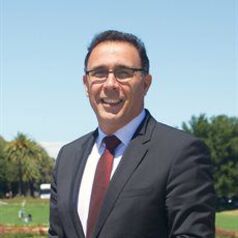
Hisham Mehanna
Professor, Institute of Cancer and Genomic Sciences, University of Birmingham
Professor Hisham Mehanna is the chair of head and neck surgery, and is the Director of the Institute of Head and Neck Studies and Education (InHANSE) at the Institute of Cancer and Genomic Sciences.
Hisham is a head and neck and thyroid surgeon with clinical interests in recurrence in thyroid and parathyroid surgery. He has a keen interest in clinical and translational research, heading a research team of 20 researchers, and holding over £15million in research grants. His research has changed clinical practice across the world.
His experience of multi-disciplinary research in the field of cancer biology and treatment has made him a strong proponent of multi- and inter- disciplinary research, as the way to provide new insights and approaches to address intractable global challenges.
As Deputy PVC, Hisham has responsibility for promoting interdisciplinary research across the University. Also as Director of the Institute for Global Innovation (IGI) and the Institute of Advanced Studies (IAS), Hisham strives to ensure that the Institutes inspire, support and deliver world-leading, multi- and inter-disciplinary research that seeks to address some of the world’s most pressing challenges, that affect humanity at a global level. The IGI’s research themes revolve around the factors that challenge, and sometimes threaten, the sustainability and resilience of individuals, communities, countries and the world as a whole. Themes include resilient cities, water challenges in a changing world, clean cooling, pollution solutions, antimicrobial resistance, ageing and frailty, gender inequality, artificial intelligence and 21st century transnational crime.
Less ![]()

Hlanganani Tutu
Professor in the School of Chemistry, University of the Witwatersrand
My research field is environmental analytical chemistry. My areas of interest include: analytical method development for water and soil analysis; the chemistry of acid mine/rock drainage; elemental speciation in polluted environments (water and soil systems); water quality assessment; remediation and mitigation aspects (development and modification of materials for the capture of pollutants in polluted water; constructed and natural wetland systems); value recovery (recovery of precious elements and rare earths from wastewaters; alternative uses of waste and wastewaters); geochemical modelling (predicting elemental speciation; forward and inverse modelling; 1-D, 2-D and 3-D reactive transport modelling; pit lake chemistry; evaporite and secondary mineral formation); and applications of artificial intelligence (optimisation and heuristic methods; classification; machine learning; deep learning; text minig; large language models; internet of things (IoT)).
Computational competence: PHREEQC, PHAST, MODFLOW, FEFLOW, Geochemist’s Workbench, Visual Minteq, Statistica, Visual Gene Developer, Minitab, SIMCA, R, SQL, Python, C and Fortran.
My published research:
Comparison of individual and ensemble machine learning models for prediction of sulphate levels in untreated and treated Acid Mine Drainage
Environmental Monitoring and Assessment
2024/04 | journal-article
DOI: 10.1007/s10661-024-12467-8
The transport of toxic elements from the Marie-Louise landfill site and nearby gold mine dumps to waterbodies
International Mine Water Association Congress 2024
2024/04 | conference-paper
Trends in Innovations and Recent Advances in Membrane Protected Extraction Techniques for Organics in Complex Samples
Critical Reviews in Analytical Chemistry
2023/08/18 | journal-article
DOI: 10.1080/10408347.2021.2013769
Microplastics in freshwater environment: the first evaluation in sediment of the Vaal River, South Africa
Heliyon
2022/10 | journal-article
DOI: 10.1016/j.heliyon.2022.e11118
Comparison of PSA to Moringa Oleifera Seed Protein as Sorbent in QuEChERS: A Response Surface Methodology Optimization for Extraction of Some Endocrine Disrupting Chemicals in Food
Journal of Chemistry
2022/09/13 | journal-article
DOI: 10.1155/2022/7161318
Multivariate optimization of a two-way technique for extraction of pharmaceuticals in surface water using a combination of membrane assisted solvent extraction and a molecularly imprinted polymer
Chemosphere
2022/01 | journal-article
DOI: 10.1016/j.chemosphere.2021.131973
In Situ Decarboxylation-Pressurized Hot Water Extraction for Selective Extraction of Cannabinoids from Cannabis sativa. Chemometric Approach
Molecules
2021/06/02 | journal-article
DOI: 10.3390/molecules26113343
Selective Extraction of Cannabinoid Compounds from Cannabis Seed Using Pressurized Hot Water Extraction
Molecules
2020/03 | journal-article
DOI: 10.3390/molecules25061335
Statistical comparison of two modeling methods on pressurized hot water extraction of vitamin C and phenolic compounds from Moringa oleifera leaves
South African Journal of Botany
2020/03 | journal-article
DOI: 10.1016/j.sajb.2018.09.001
Sorption of uranium(VI) onto hydrous ferric oxide-modified zeolite: Assessment of the effect of pH, contact time, temperature, selected cations and anions on sorbent interactions
Journal of Environmental Management
2017/12 | journal-article
DOI: 10.1016/j.jenvman.2017.09.034
Synthesis and characterization of a molecularly imprinted polymer for the isolation of the 16 US-EPA priority polycyclic aromatic hydrocarbons (PAHs) in solution
Journal of Environmental Management
2017/09 | journal-article
DOI: 10.1016/j.jenvman.2017.05.041
Dispersion of inorganic contaminants in surface water in the vicinity of Potchefstroom
Physics and Chemistry of the Earth, Parts A/B/C
2017/08 | journal-article
DOI: 10.1016/j.pce.2017.04.008
Less ![]()

Ho Seok Ahn
Senior Research Fellow, Department of Electrical, Computer and Software Engineering, University of Auckland, Waipapa Taumata Rau
Less ![]()

Hoa Nguyen
Associate Professor, School of Education, UNSW Sydney
Hoa Nguyen, PhD, is an Associate Professor in the School of Education at the University of New South Wales, Australia. Hoa conducts research in the areas of teacher education/development and mentoring.
Less ![]()

Hoda Asgarian
PhD Student, Faculty of Law, Bond University
Hoda Asgarian completed her bachelor’s degree in law at Allameh Tabatabayi University in Iran. Driven by her fascination with international affairs, she pursued an LLM in International Law at the same university, and later specialised in and earned a second LLM in Maritime Law from Lund University in Sweden.
Hoda is licensed to practice law in Iran and has extensive experience as a sole practitioner and as an in-house legal counsel at Unilever, among other multinational corporations. Hoda has published several academic articles and is currently a Ph.D. student at Bond University in Australia, and her research focuses on environmental law and climate change, which she considers one of the most pressing international issues of our time.
Less ![]()


Holger Görg
Acting President, Kiel Institute for the World Economy
Holger Görg is currently Acting President of the Kiel Institute for the World Economy and Professor of International Economics at the University of Kiel. He is also Director of the Kiel Centre for Globalization, and is affiliated with the FIND Research Centre at Aarhus University, GEP at Nottingham University and IZA in Bonn. Before joining Kiel in 2008 he was on the staff at the University of Nottingham (2000 – 2008), the University of Ulster at Jordanstown and University College Cork. He completed a Ph.D. in Economics in 1999 at Trinity College Dublin.
His research interests are in empirical international trade and industrial organisation focusing in particular on the activities of multinational companies, foreign direct investment, and international outsourcing. He has published widely in international journals. Holger has also worked as Consultant for, among others, The World Bank, European Commission, UNIDO, UN Economic Commissions for Europe and Africa, and government bodies in the UK, Ireland and Germany.
Less ![]()

Holger Nehring
Professor in Contemporary European History, University of Stirling
Holger Nehring is a historian of post-1945 Western Europe, with special interest in the history of peace and other forms of social activism in Britain and West Germany, the intellectual history of the 'nuclear age', and the social history of the Cold War. He received his training in contemporary history, political science and philosophy at Tübingen University (Germany), the London School of Economics, and (as a Rhodes scholar) at University College, Oxford. Before joining the Sheffield History Department in March 2006, he was based at St. Peter's College, Oxford, as a junior research fellow. His book "Politics of Security", a comparative and transnational study of British and West German protests against nuclear weapons and their meanings in the context of the Cold War from 1945 to the late 1960s, was published by Oxford University Press in October 2013.
Less ![]()

Hollie Bendotti
Postdoctoral Research Fellow, School of Public Health and Thoracic Research Centre, The University of Queensland
Less ![]()
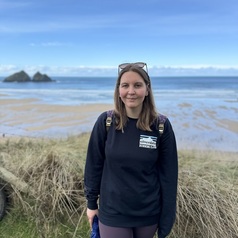
Hollie Birkinshaw
Research Fellow, Primary Care, University of Southampton
Hollie is an experienced researcher in chronic pain, focusing particularly on musculoskeletal pain and the integration of psychology in pain and health services research through multiple research projects:
- Leading a Cochrane review and network meta-analysis on the efficacy and safety of antidepressants for chronic pain.
- Exploring pain-related distress in chronic musculoskeletal pain and how to address this in primary care.
- Exploring the psychosocial mechanisms of chronic pain as part of the Consortium to Research Individual, Interpersonal, and Social mechanisms of pain (CRIISP, as part of the Advanced Pain Discovery Platform).
- Working within primary care randomised controlled trials for stratified care and clinician decision support systems.
Hollie’s has a School for Primary Care post-doctoral fellowship that was awarded the Elizabeth Murray award to explore the development of pain related distress in musculoskeletal pain.
Less ![]()
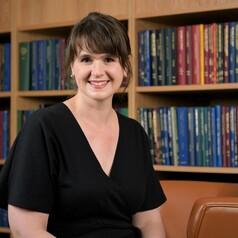
Holly Doel-Mackaway
Senior lecturer, Macquarie University
Holly Doel-Mackaway is an academic at the Macquarie University Law School. Her interdisciplinary research focuses on international human rights law with a particular focus on children and young people.
Her 2022 book 'Indigenous Children's Right to Participate in Law and Policy Development' (Routledge) presents a model for reforming and developing Indigenous related legislation and policy in Australia and internationally. The model provides guidance about how to seek, listen to and respond to the voices of Indigenous children and young people.
Before becoming an academic Holly worked as a lawyer across more than 20 countries for the United Nations and various international non-government organisations providing specialised advice on international children’s rights law. She has held senior legal and managerial positions with a range of child focused agencies including UNICEF, Save the Children and the NSW Department of Community Services. Holly also operates a child rights consulting practice providing children's rights research, training, legislative and policy advice nationally and internationally on matters relating to child protection, girls’ rights, the commercial sexual exploitation of children, children engaged in armed conflict and child rights-based approaches to research and development.
Prior to becoming a lawyer Holly worked as a social worker with women and children who had experienced domestic violence and sexual abuse.
Less ![]()

Holly Furneaux
Professor of English Literature, Cardiff University
Professor Holly Furneaux specialises in Victorian literature and culture. Together with Matilda Greig she is editor of Enemy Encounters in Modern Warfare and her book on Enemy Intimacies and Strange Meetings in Writings of Conflict 1800-1918 is forthcoming with Oxford University Press. Her research is featured in the current War and the Mind Exhibition at Imperial War Museum and she previously curated Created in Conflict: Soldier Art from the Crimean War to the Present. Her previous books include Military Men of Feeling: Emotion, Touch and Masculinity in the Crimean War and Queer Dickens: Erotics, Families, Masculinities. She was an advisor for the BBC's Dickensian.
Less ![]()

Holly High
Associate Professor, Anthropology, Deakin University
I am an anthropologist, do fieldwork in Laos and use ethnographic methods and anthropological analysis to understand human experience. I was trained at Australian National University, and have held postdoctoral fellowships at Yale, Cambridge and Sydney. Now I live, work and raise two kids on the beautiful Wadawarung lands and I am a member of the Alfred Deakin Institute at Waurn Ponds Campus, Deakin University.
I have written about anthropological approaches to debt, power and desire; psychoanalytic theory and anthropology; Lao policy (including cultural, poverty, health and agricultural policies) in relation to lived experience in that country; everyday politics in Laos; emerging infectious disease as an intercultural zone; and religion in Laos.
Currently, I am investigating transformations in pregnancy, birth and early childhood in Laos.
Less ![]()


Holly Michael
Director, Delaware Environmental Institute, and Professor of Earth Sciences and Civil and Environmental Engineering, University of Delaware
Holly Michael is the Unidel Fraser Russell Chair in the Environment and Professor in the Departments of Earth Sciences and Civil and Environmental Engineering at the University of Delaware. She is also Director of the Delaware Environmental Institute. She holds a BS in Civil Engineering from the University of Notre Dame and a PhD in Hydrology from the Massachusetts Institute of Technology. She is an Associate Editor of Water Resources Research and served as the Geological Society of America James B. Thompson, Jr. International Distinguished Lecturer. Her research interests include saltwater intrusion, water resource management, contaminant hydrology, coastal hydrogeology, groundwater-surface water interactions, and geostatistics. Some of her current projects include investigating the coastal critical zone, measuring groundwater flow into estuaries, modeling groundwater salinization due to climate change, evaluating sustainability of arsenic-safe groundwater in Bangladesh, and application of experimental economics to groundwater resources.
Less ![]()

Holly Squire
Special Projects Editor
Holly joined The Conversation at the start of 2015 from a background in broadcast journalism and magazine publishing having previously worked at the BBC as a journalist and researcher in radio and television. Holly regularly contributes to The Conversation's podcast The Anthill. Her role is part-funded by the Independent Social Research Foundation. She is based near Brighton.
Less ![]()

Holly Walters
Visiting Lecturer in Anthropology, Wellesley College
Cultural anthropologist whose ethnographic work focuses on pilgrimage and politics in the Nepal Himalayas, as well as material culture, divine personhood, and ritual practice in South Asia. Drawing on theoretical frameworks in psychological/medical and linguistic anthropology, her current research addresses the roles of sacred landscapes and digital religious revival in the relationships between Hindus, Buddhists, and Bonpos who venerate sacred fossils, called Shaligrams.
Less ![]()

Holly Weir
Researcher in Architecture and Cities, University of Westminster
An experienced urban planner and researcher, passionate about people-centred planning and creating places where people can be active and healthy. With experience in both practice and academia, Holly's work cuts across the boundaries to produce outputs with impact. Her knowledge stems across the fields of urban planning and public health, exploring how places can encourage physical activity and reduce inequalities. Holly also has a particular interest in children as users of public space and in child-friendly neighbourhoods, which her PhD research focuses on.
Less ![]()
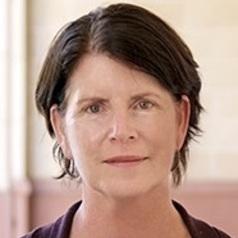
Holly Willis
Professor of Cinematic Arts, University of Southern California
Holly Willis is the Chair of the Media Arts + Practice Division in USC’s School of Cinematic Arts, where she teaches classes on digital media, post-cinema and feminist film. She co-leads USC's Center for Generative AI and Society, which aims to create a space for artists, writers, journalists and others in the humanities to engage both creatively and critically with emerging forms of AI.
She is the author of Fast Forward: The Future(s) of the Cinematic Arts and New Digital Cinema: Reinventing the Moving Image, as well of Björk Digital, and the editor of both The New Ecology of Things, a collection of essays about ubiquitous computing, and David O. Russell: Interviews. She is also the co-founder of Filmmaker Magazine dedicated to independent film; she served as editor of RES Magazine and co-curator of RESFEST, a festival of experimental media, for several years; and she writes frequently for diverse publications about experimental film, video and new media, while also exploring experimental nonfiction and poetry. Her work has appeared in publications such as Film Comment, Afterimage, Los Angeles Review of Books, Variety, River Teeth and carte blanche.
Less ![]()


Holly-Anne Turner
PhD Candidate, Palaeobotany, University College Cork
My research interests are in plant evolution and palaeobotany. Fossils are an important insight into how organisms and ecosystems have changed over time, with palaeobotanists assessing plant fossils in particular. My first research project studied fossils of early land plants to investigate the evolution of leaf organisation. For my PhD I am researching plant fossils following the worst mass extinction event in Earth's history, the end-Permian event, to understand the responses of ecosystem inhabitants to environmental change.
Less ![]()

Homa Kheyrollah Pour
Assistant Professor, Canada Research Chair, Executive Director of the Cold Regions Research Centre, Wilfrid Laurier University
I am Tier 2 Canada Research Chair (CRC) in Remote Sensing of Environmental Change and the Executive Director of the Cold Regions Research Center at Wilfrid Laurier University. My research combines theoretical and practical approaches toward deepening the understanding of the small- to large-scale physical, hydrological, and cryospheric processes and interactions in the cold regions and water science. I am an active participant in the Laurier-Government of Northwest Territories Partnership, collaborating with communities in the Northwest Territories on issues like water quality, ice safety, and sustainable water management. I am an advocate for bridging the gap between science and policy, believing that scientific findings must be accessible to decision-makers. I have been collaborating with the Canadian Science Policy Centre since 2016, and joined the Board of Directors in 2020.
Less ![]()

Hone Mandefro
Ph.D Candidate and Public Scholar, Concordia University
Hone Mandefro Belaye is a doctoral candidate in the Department of Sociology and Anthropology at Concordia. Hone holds a Master of Arts in development studies from the International Institute of Social Studies in The Hague and a Master of Arts in social work from Addis Ababa University. He earned his Bachelor of Arts in sociology and social work from Jimma University in Ethiopia.
Hone’s research examines the change and continuity in relationships among neighbours as their living space in Addis Ababa, Ethiopia, changes from single-story houses to high-rise condominiums. His research is supported by a Vanier Scholarship from Social Sciences and Humanities Research Council and Wadsworth International Fellowship from the Wenner-Gren Foundation. Before Moving to Montreal as a Public Leadership Fellow at Jeanne Sauvé Foundation/McGill University in 2017, Hone was a lecturer in the School of Sociology and Social Work and director of Community Services at the University of Gondar in Ethiopia.
Less ![]()

Hong Bo
Professor of Financial Economics, SOAS, University of London
Hong Bo is a Professor of Financial Economics at the School of Finance & Management SOAS University of London. Professor Bo received her degrees in Economics from Lanzhou University of China (BA), Renmin University of China (MSc), London School of Economics and Political Science UK (MSc.), and University of Groningen the Netherlands (PhD). Before joining SOAS in 2004, she was an assistant professor at the Faculty of Economics, University of Groningen.
Professor Bo’s research covers topics in financial economics, including firm investment decisions under uncertainty, capital market imperfections, comparative financial systems, corporate finance, corporate governance, and the Chinese economy. She has published in internationally well-recognized academic journals, including Journal of Corporate Finance, Review of Finance (formerly European Finance Review), Journal of Banking and Finance, Economica, Regional Studies, European Journal of Finance, and International Review of Financial Analysis, etc.
Over the years, Professor Bo’s PhD supervision has covered various topics on the Chinese financial system and the corporate sector. Finished and ongoing PhD projects include investment behaviour of Chinese firms; seasoned equity offering of Chinese firms; China’s private equity market; corporate bond market in China; China’s overseas infrastructure investment; Interaction between African firms and Chinese firms in Africa; International activities of Chinese banks; and China’s peer to peer lending market. Professor Bo also has experience in academic management, having been associate dean and associate director for learning and teaching at SOAS University of London between 2016-2019.
In addition to her responsibilities at SOAS, Professor Bo has also actively engaged with the general public regarding knowledge transfer beyond SOAS by delivering public lectures for industries, providing executive training for officials in international organisations, and teaching for other universities both in the UK and overseas. She has also provided expert commentary for the media including BBC World News (Business Live; Asian Business Report), CNBC Europe Closing Bell, Sky News, TRT WORLD, RT TV, and CCTV dialogue, etc.
Less ![]()
- Market Data




















